Senior executives and nonexecutive managers are unhappy with the performance of their companies’ frontline managers, according to a McKinsey survey.1 The low level of satisfaction, the results indicate, stems from the way frontline managers’ jobs are structured and from inadequate training, not merely a lack of skills on the part of frontline managers.
Other McKinsey work has shown that empowering frontline managers to make decisions, anticipate problems, and coach their direct reports (rather than simply following and giving orders and solving crises) generates higher productivity and other benefits.2 However, the results of this survey indicate that most companies do not enable frontline management to focus on the right priorities and become more productive. Respondents say the most common role for frontline managers consists merely of performing assigned tasks, identifying and fixing problems, and successfully confronting unexpected, everyday challenges or crises as they arise (Exhibit 1). Only 11 percent say their companies’ frontline-management roles are structured so that managers focus on coaching and developing their direct reports.
Further, while frontline employees receive extensive training and development, their managers—who may have had no previous experience leading others—do not. At all levels, executives believe that the little training they do receive fails to prepare them to take on leadership roles successfully.
Frontline management’s role
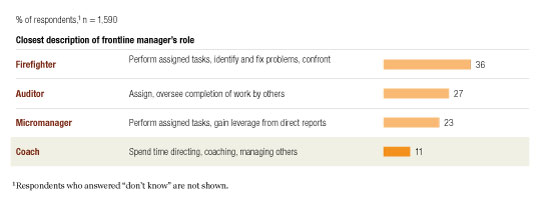
Inadequate training
Nearly 70 percent of senior executives are only “somewhat satisfied” or “not at all satisfied” with the performance of their companies’ frontline managers (Exhibit 2). More worrisome still, the vast majority of frontline managers (81 percent) say they are not satisfied with their own performance. One of the main reasons for the lack of satisfaction is that companies’ training programs are not designed to help frontline managers, despite the potential impact their jobs can have. Only 10 percent of respondents say their companies’ frontline manager training is effective in preparing managers to lead. At this minority of companies, training emphasizes leadership and interpersonal skills (Exhibit 3).
While frontline employees are provided with extensive training, managers are not (Exhibit 4)—even though for many, their present jobs may represent their first experiences leading others. Perhaps frontline managers receive less training because of the way their jobs are designed at most companies: managers are expected to ensure that their direct reports do the things that the managers themselves excelled at to begin with.
Unimpressed with frontline managers
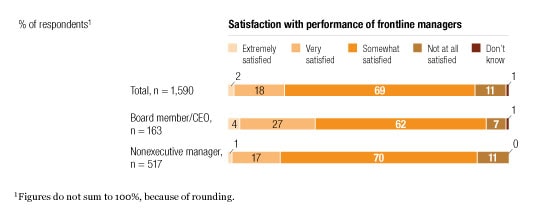
Mixed results of training
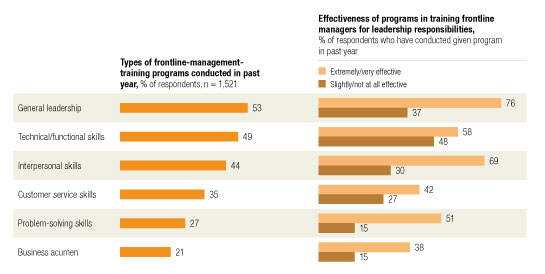
Modest training for frontline managers
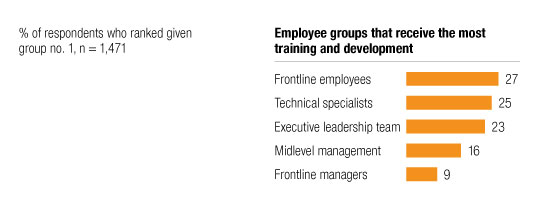
Barriers to improving effectiveness
Executives say the biggest barriers to improving the effectiveness of frontline management involve how the jobs themselves are structured (Exhibit 5). Managers spend too much time on administrative tasks, and their responsibilities are limited to fixing problems as they arise and following and giving orders. Constantly solving unexpected problems and being rewarded for doing so may also create negative unintended consequences, as managers will likely lack the motivation to anticipate problems in the first place.
Perhaps even more significantly, senior leadership doesn’t seem to recognize the real burdens of the jobs. While 56 percent of nonexecutive managers view time spent on administrative tasks as the biggest barrier to improving their own effectiveness, only 36 percent of senior executives concur. Nor are senior executives aware of how their companies’ frontline managers spend their time (Exhibit 6). Thirteen percent of nonexecutive employees estimate that frontline management spends no time at all coaching direct reports; only 3 percent of senior executives recognize this issue.
Interestingly, barriers do not vary much in relation to the structure of frontline managers’ roles. A possible explanation is that regardless of how their jobs are structured, managers still have to fix unexpected problems and complete paperwork.
Red tape and fuzzy responsibilities
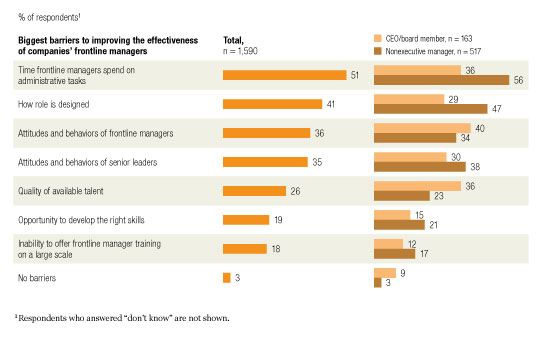
Little time for coaching
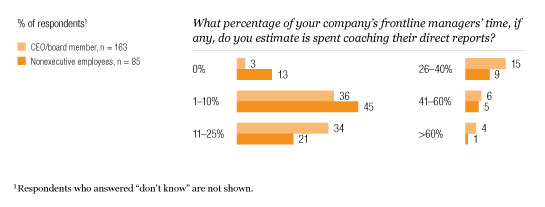
The few that get it right
At the 11 percent of companies where frontline management spends most of their time directing and managing others, emphasizing coaching, and developing their direct reports, executives are much more likely to be satisfied (39 percent, compared with 20 percent overall) with the performance of frontline managers. At these companies, training is more likely to focus on developing leadership skills, so managers are better prepared to take on those responsibilities (Exhibit 7). Indeed, 71 percent of respondents at companies where frontline managers’ jobs emphasize coaching say training programs focus on developing leadership skills, versus 53 percent overall. Further, these companies are more likely to conduct training that develops interpersonal and customer service skills and least likely to conduct programs that focus on the development of technical skills. Nonetheless, even executives at these companies say that time spent on administrative tasks presents the biggest barrier to improving the effectiveness of the front line.
What frontline managers are taught
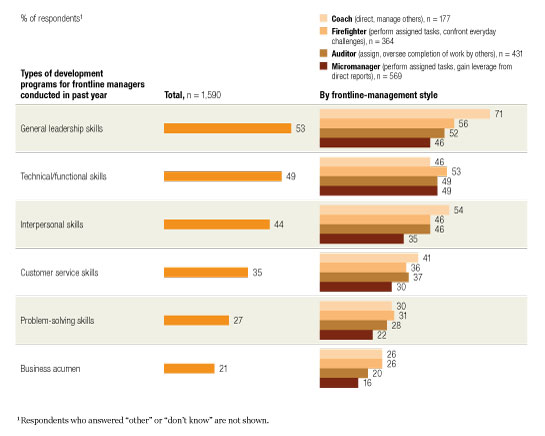
Looking ahead
-
Frontline managers receive little training, and the little they do receive does not prepare them for leadership responsibilities. Increasing the total number of hours dedicated to training and providing training programs that develop leadership and interpersonal skills could help managers improve their performance.
-
Lack of satisfaction with the performance of frontline management is tied to the way frontline managers’ jobs are designed. By redefining the responsibilities and expectations of frontline management, companies can improve the front line’s performance. Rather than focusing on fixing problems and auditing the work of others, these managers could focus on anticipating problems and coaching their direct reports.
-
Senior leaders and frontline managers have different perceptions of what hinders the performance of the front line. They must set aside the belief that frontline employees lack the necessary skills to coach their direct reports or make quality decisions. Further, leaders could actively model the behavior they expect from frontline management.

